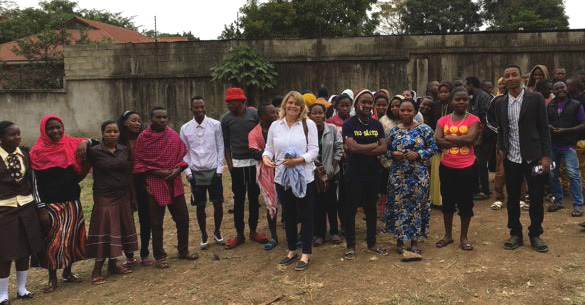Kim Torreggiani recently spent three weeks in Tanzania with TRU’s Leave for Change program, volunteering as a fundraising advisor.
The director of development for the School of Business and Economics, Torreggiani decided to use her three weeks of vacation to help a small institution in Usa River, near the city of Arusha. TRU sponsors up to four faculty and staff members to participate in Leave for Change annually. Donating their vacation time, volunteers share their particular knowledge and skills in a developing country, with all other costs covered by the program.
Torreggiani prepared for volunteer work for the Rians Institute of Professional Studies—and the dramatic shift from a hot Canadian summer to a cool Eastern African winter—by attending an in-depth, two-day workshop provided by Leave for Change.
During the workshop, volunteers were equipped for the experience of working abroad, learning about conflict management, intercultural communication, gender equity and equality issues, capacity building, power and privilege, culture shock and reverse culture shock.
After arrival, the first two days included a tour of the city, a Swahili language lesson and a meeting with the local doctor. She also met the staff at the World University Service of Canada (WUSC) office and the Rians Institute of Professional Studies to discuss the work plan for the coming weeks.
Torreggiani hosted several workshops for the staff at the institute, which resulted in the formation of a new student committee to plan an annual fundraising event, and a student-led alumni association to raise funds from past graduates. When she started, the staff at Rians were hesitant about the possibility of raising any money—an unheard-of concept in Arusha—but she has managed to bring them all on board.

Kim Torreggiani with students at Rians Institute of Professional Studies.
She said what surprised her the most was the institute’s facilities. “They do not have computers, they do not have a library, and they do not have access to the Internet. They are able to educate 150 students a term with very little in terms of infrastructure.”
The students sleep on foam pads on the floor with more than 15 to a room, she said. “But they are happy and thrilled to have the opportunity to advance their education. You can feel their determination, it’s palpable.”
Since returning to Kamloops and TRU, Torreggiani says that she is still processing.
“It is almost impossible to articulate how this experience has changed me, but I can say that I feel a dramatic change in my perceptions and my knowledge of East Africa. I see how rich and diverse their culture is and how happy and kind the people are there. My viewpoint on how we can help developing countries has shifted, and to say it makes me appreciate what I have is an understatement.”
Her advice for other hopeful volunteers?
“Do it! The entire time I was there I could not stop thinking about how fortunate I was to have this chance, this opportunity of a lifetime,” she said. “Not only did I feel that I was able to make a difference, I was given an experience that was far more effective than traditional professional development training.”
Torreggiani was joined in Tanzania by TRU colleagues Waldemar Miszurka from finance, who volunteered as a finance advisor, and Mohd from computer science, who volunteered as a computer science advisor.
Five computers were donated to the school thanks to Matti Haverila, Lian Dumouchel, Peter Tsigaris, Ivan Desjardins, and TRU’s IT Services department. TRU faculty and staff also provided a big box of donated textbooks and TRU shirts.
The Leave for Change program is open to all full-time TRU employees who have completed their probationary period. There are positions available in Africa, Asia and Latin America for a variety of professional skill sets. Leave for Change is run by Uniterra, a leading Canadian international volunteer cooperation program of which TRU became a member in April 2015.

